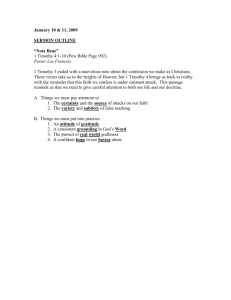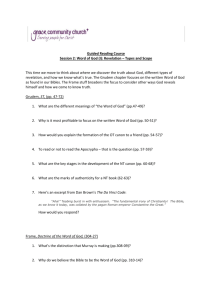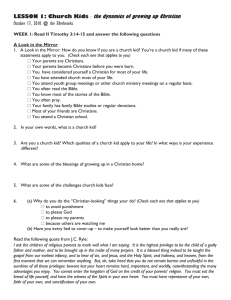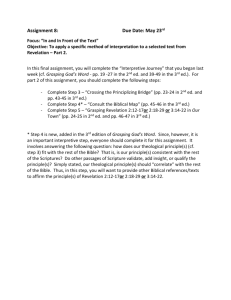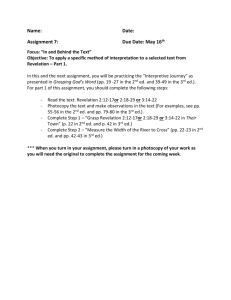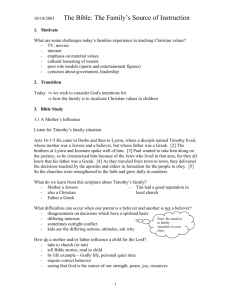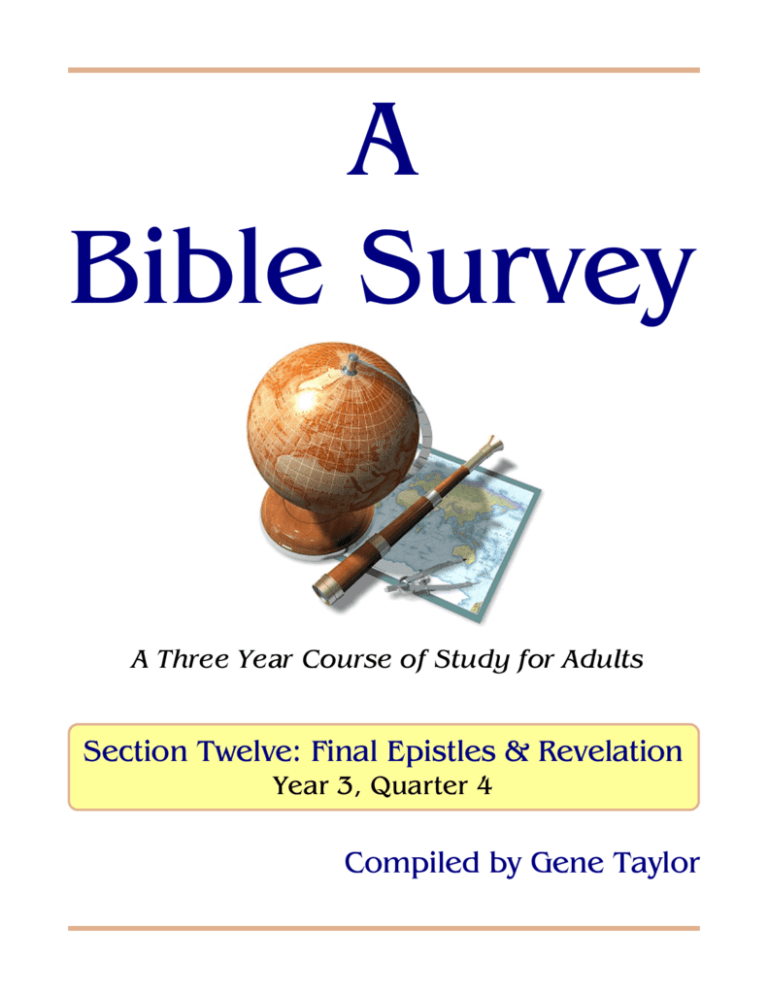
A
Bible Survey
A Three Year Course of Study for Adults
Section Twelve: Final Epistles & Revelation
Year 3, Quarter 4
Compiled by Gene Taylor
Preface
These lessons were first compiled over a three year period from April 1988 through March 1991. The
then Westside church of Christ in Tallahassee, Florida (Now the Centerville Road church relocated to
4015 Centerville Road in Tallahassee) determined to place all their Sunday morning Bible classes on
the Amplified Bible Curriculum (Hereafter referred to as ABC) developed by JoLinda Crump and Cathy
Valdes.
While their curriculum recommended materials from preschool through senior high, we desired to place
our college, young adult, and adult classes on the same schedule. The volume of material in L.A. Mott’s
studies, recommended in the ABC for source material and lesson development, did not easily lend itself
to a once a week study since he designed his lessons to be studied twice each week.
Considering these factors, I took it upon myself to compile these lessons. We used them successfully
while cycling through the curriculum twice in our senior high, college, young adult, and adult classes
from April 1988 through March 1994. They were edited and revised prior to the second study of them.
They have been revised a second time and reformatted in 1997.
I have tried to parallel the ABC as much as possible so that adults and children would be studying the
same lesson at the same time only on different levels. But this series, or any one of its twelve study
guides, may be used independently.
Each lesson contains a schedule for daily Bible reading. It can be used as a format for family
devotionals in the home even if the whole family is not on the curriculum.
I hope you enjoy your study.
Gene Taylor
July 1997
Bible Survey Section Twelve: Final Epistles and Revelation
Gene Taylor
-1-
Table of Contents
Preface ..................................................................................................................................................... 1
Table of Contents ..................................................................................................................................... 2
Lesson One: For the Young .................................................................................................................... 3
Lesson Two: Young Timothy ................................................................................................................. 5
Lesson Three: Elders .............................................................................................................................. 7
Lesson Four: Deacons ............................................................................................................................ 8
Lesson Five: Servitude ............................................................................................................................ 9
Lesson Six: Superior New Covenant ....................................................................................................... 11
Lesson Seven: Roll Call of Faith ............................................................................................................ 13
Lesson Eight: Faith Demands Works ..................................................................................................... 15
Lesson Nine: Bridle the Tongue ............................................................................................................. 17
Lesson Ten: Suffering for Right ............................................................................................................. 19
Lesson Eleven: False Teachers ............................................................................................................... 21
Lesson Twelve: God Is Love .................................................................................................................. 23
Lesson Thirteen: The Revelation ........................................................................................................... 25
© Gene Taylor, 1997. All Rights Reserved.
Bible Survey Section Twelve: Final Epistles and Revelation
Gene Taylor
-2-
Lesson One: For the Young
Encouragement to Faithfulness (2 Timothy 2:1-13)
Lesson Text
2 Timothy 2:1 - 3:26
1 Timothy 4:1-16
Daily Bible
Reading
1. Seeing numerous appeals for faithfulness in this passage, in the light of the
whole book, what temptations to unfaithfulness confronted Timothy?
2. What three figures are used by Paul to illustrate Timothy’s position in
the world? What is the main point of each?
3. Since many temptations to unfaithfulness may confront him, to what
does Paul point Timothy as a source of courage and strength?
4. What reason(s) for faithfulness is given in verses 11 through 13? Is there
a direct relation between these verses and the preceding ones? Explain.
The One Approved of God (2 Timothy 2:14-26)
Monday
2 Timothy 2:1-13
Tuesday
2 Timothy 2:14-26
Thursday
2 Timothy 3:1-9
Friday
2 Timothy 3:10-17
5. Considering the context, what harm is done by the wrong kind of teaching?
6. In what was Timothy to “be diligent?” (KJV : “study”) Why?
7. Who were Hymenaeus and Philetus? What great damage had they done?
How had they done it?
8. What is the “solid (firm) foundation of God?”
9. What are “youthful lusts?” How can one flee them?
Saturday
1 Timothy 4
Lesson
Concept
10. While fleeing “youthful lusts,” what should one pursue? Why? Define
each thing mentioned.
11. What are the characteristics and methods of one who does the Lord’s
work? (vv. 23-26)
Apostasy Predicted (1 Timothy 4:1-5)
12. Describe the apostasy foretold by Paul in terms of:
a. Its ultimate source.
b. The means by which effected.
CHRISTIANITY
c. The character of the men involved.
Teaching the young
d. Teachings.
Bible Survey Section Twelve: Final Epistles and Revelation
Gene Taylor
-3-
13. What is said in regard to meats?
A Good Minister of Jesus Christ (1 Timothy 4:6-16)
14. According to this text, what are the characteristics of “a good minister of Jesus Christ?”
15. What is meant by “godliness?” (vv. 7-8)
16. Compare bodily exercise to spiritual exercise as to the value of each. What does that teach us
concerning priorities?
17. Why should one strive after godliness even being willing to labor and suffer reproach?
18. How and why would people “despise” the “youth” of Timothy? Could that same reasoning apply to
the youth of today? How can the young keep this from happening?
19. List the areas in which Timothy, as a young man, was to be an example to believers. Tell what
would be involved in each area.
20. For what two reasons should a preacher preach and teach?
Bible Survey Section Twelve: Final Epistles and Revelation
Gene Taylor
-4-
Lesson Two: Young Timothy
Paul’s Introduction to Timothy (Acts 16:1-5)
Lesson Text
1 Timothy 1:1-20
2 Timothy 1:1-18; 4:1-22
Acts 16:1-5
Daily Bible
Reading
1. Where did Paul meet Timothy? On which of his preaching journeys was
he? What did he want of Timothy?
2. Tell what is known of Timothy’s background.
3. Why did Paul have Timothy circumcised? (cf. 1 Cor. 9:19-22) Explain
why he had Timothy circumcised but not Titus. (cf. Gal. 2:1-5)
Timothy in Ephesus (1 Timothy 1:1-17)
4. Why, when he journeyed on to Macedonia, did Paul leave Timothy in
Ephesus?
Monday
1 Timothy 1
Tuesday
2 Timothy 1
5. What, according to Paul, is the purpose of law? Does that mean that the
“righteous person” has no need of law? Explain.
A Charge to Timothy (1 Timothy 1:19-20)
6. What charge did Paul commit to Timothy?
Thursday
2 Timothy 4
Friday
Acts 16:1-5
2 Timothy 3:14-15
Saturday
1 Thessalonians 3:1-4
7. What “prophecies” were meant in verse 18? (See possibly 4:14 and Acts
13:1-3)
8. Who were Hymenaeus and Alexander? Why are they mentioned here?
What had Paul done concerning them? Why?
9. Does this passage teach the possibility of apostasy.? Explain.
Lesson
Concept
10. What, according to this text, will keep one from making “shipwreck” of
their faith?
Paul and Timothy (2 Timothy 1:1-18)
11. Describe the relationship between Paul and Timothy. How did Paul feel
about him?
OBEDIENCE
Expecting exact adherence
to God’s law
12. What was the “gift” in Timothy? How had he received it? What would
Paul have him to do with it?
Bible Survey Section Twelve: Final Epistles and Revelation
Gene Taylor
-5-
13. Why might Timothy be “ashamed of the testimony of our Lord” and of Paul “his, prisoner?” In light
of this, what did Paul encourage him to do? Why?
14. How could Timothy, and we today, “hold fast the pattern of sound words?”
Paul’s Last Charge to Timothy (2 Timothy 4:1-22)
15. How does Paul establish the gravity of the charge found in this chapter?
16. Using this text, what does it mean to “preach the word?”
17. Why will people not “endure sound doctrine?”
18. What is meant by “itching ears?” What are some consequences of having them?
19. How could Timothy “do the work of an evangelist?”
20. What were some reasons why Paul wanted Timothy to come to him quickly?
Bible Survey Section Twelve: Final Epistles and Revelation
Gene Taylor
-6-
Lesson Three: Elders
Bishops (1 Timothy 3:1-7)
Lesson Text
1 Timothy 3:1-7
Titus 1:5-9
1 Peter 5:1-4
Daily Bible
Reading
1. What is a bishop?
2. How can one desire the office of bishop without abandoning such traits
as humility, meekness, etc.?
3. List the qualities given here that one who would do the work of a bishop
must possess and briefly define each.
Elders (Titus 1:5-9)
4. Is the charge to appoint elders conditional or unconditional? Cite
evidence.
Monday
1 Timothy 3:1-7
1 Peter 5:1-4
Tuesday
1 Timothy 5
Thursday
Titus 1:5-9
5. Give at least three points from this passage which contribute something
toward understanding the position and function of elders in the church.
6. Compare and contrast the qualities of an elder that are given here with
those qualities found in 1 Timothy 3:1-7.
7. What is a gainsayer? By what means is an elder to stop the mouth of
such a one?
Friday
Titus 2
Exhortations to Elders (1 Peter 5:1-4)
Saturday
Titus 3
8. According to this passage, what is the function of elders?
9. What restrictions are placed upon elders as they do their work?
Lesson
Concept
10. What reward are elders promised?
CHURCH
Rec ognizing God’s
organization
Bible Survey Section Twelve: Final Epistles and Revelation
Gene Taylor
-7-
Lesson Four: Deacons
1. What is a deacon?
Lesson Text
1 Timothy 3:8-13
Daily Bible
Reading
2. Define each of the following qualities which are listed as necessary to
doing the work of a deacon. Explain the relevancy of each.
a. Reverent. (KJV : “grave”)
b. Not double-tongued.
c. Not given to much wine.
Monday
1 Timothy 3:8-13
Tuesday
Galatians 5:13
Romans 6:16-19
Thursday
Acts 6:1-6
Philippians 1:1
Friday
1 Timothy 2
Saturday
1 Timothy 6
d. Not greedy for money. (KJV : “not greedy of filthy lucre”)
e. Holding the mystery of the faith with a pure conscience.
f. Tested. (KJV : “proved”)
g. Blameless.
h. Husband of one wife.
j. Ruling their children and their own houses well.
3. How should verse 11 be understood in the context? For example, does
it apply to women in general, wives of deacons and/or elders, or
deaconnesses (women servants as in Romans 16:1)? Explain.
Lesson
Concept
CHURCH
Rec ognizing God’s
organization
Bible Survey Section Twelve: Final Epistles and Revelation
Gene Taylor
-8-
Lesson Five: Servitude
Philemon and Onesimus (Philemon 1-25)
Lesson Text
Philemon
1 Peter 2:18-25
Titus 2:9-11
Daily Bible
Reading
1. Who was Philemon? Where did he live? (cf. Colossians 4:7-18)
2. How would you characterize Philemon as a person?
3. Who was Onesimus? What kind of person was he?
4. What did the apostle Paul say to Philemon concerning Onesimus? Why?
5. Why did Paul “appeal to” (KJV : “beseech”) Philemon (v. 10) instead of
giving him a “command?” (v. 8)
6. What did Paul himself propose to do in behalf of Onesimus?
Monday
Titus 2:9-11
Tuesday
Philemon
Thursday
1 Peter 2:18-25
7. What confidence did Paul have in Philemon? Why?
8. From Ephesians 6:5-9 and Colossians 3:22 - 4:1:
a. How is the servant to work for his master?
b. What is “eyeservice?” What is the opposite of it?
c. Who is the servant’s real master?
Friday
Ephesians 6:5-9
d. How are masters to treat their servants? Why?
Saturday
Colossians 3:22-25; 4:1
8. From the context in Philemon, does the gospel condemn slavery? Explain.
Lesson
Concept
The Servant-Master Relationship (1 Pet. 2:19-25)
10. How is the servant to view his relationship to his master? Does it make
any difference if the master is harsh instead of good and gentle? Explain.
11. How much of an application, if any, can one make of this passage
today? Explain.
CHRISTIANITY
Serving others
The Attitude of Servants (Titus 2:9-11)
12. In what are servants to be obedient to their masters? Are there any
exceptions to that command? Explain.
Bible Survey Section Twelve: Final Epistles and Revelation
Gene Taylor
-9-
13. How does a servant “adorn the doctrine of God” by his actions? Explain.
14. What does it mean to:
k. Be “answering back ” (KJV : “answering again”)? (v. 9)
b. Be “pilfering” (KJV : “purloin”)? (v. 10)
15. What application, if any, can be made of the principles found in this text to one’s relationship to
Christ?
Bible Survey Section Twelve: Final Epistles and Revelation
Gene Taylor
-10-
Lesson Six: Superior New Covenant
The Superiority of Christ to Prop hets and Angels (1:1 - 2:18)
Lesson Text
Hebrews 1:1 - 9:28
Daily Bible
Reading
1. Through whom did God speak to man in times past? Through whom
does He speak now?
2. What is meant by the term “last days?” (1:2)
3. List the reasons given in chapter one as to why the Son is said to be
superior to angels.
4. What does a scepter represent? What relationship does it have to the
phrase “sit at my right hand?” (1:13)
5. How did the “word spoken through angels prove steadfast?” What
happened to those who were disobedient to it?
Monday
Hebrews 1-2
Tuesday
Hebrews 3
Thursday
Hebrews 4-5
Friday
Hebrews 6-7
Saturday
Hebrews 8-9
Lesson
Concept
6. What results from disobeying the word spoken through the Son?
7. How was the word of the Son confirmed?
The Superiority of Christ as a Leader (3:1 - 4:13)
8. How is Jesus worthy of more glory than Moses?
9. Compare and contrast the respective roles of Moses and Jesus in the
house of God.
10. Who is the house of God today? What must one do to remain in that
house?
11. What “promise...rest” remains for the children of God? How can one
come short of it?
12. What connection is there between the rest that remains for the children
of God and God’s rest on the seventh day of creation?
13. What, according to 4:11, is necessary to enter the heavenly rest?
14. How is the word of God:
a. “Living?”
CHURCH
Establishing
spiritual Israel
b. “Active?”
c. “Sharper than any two-edged sword?”
d. “A discerner of the thoughts and intents of the heart?”
Bible Survey Section Twelve: Final Epistles and Revelation
Gene Taylor
-11-
The Superiority of Christ as a Priest (4:14 - 7:28)
16. Why is it important for Jesus to be tempted “in all points as we are?”
16. What is the main responsibility of the high priest?
17. What qualified Jesus to serve as high priest?
18. Who was Melchizedek? What bearing does he have on Jesus?
19. How is the priestly order of Melchizedek shown to be superior to the Levitical order?
20. What imperfection was there to the Levitical priesthood?
21. Why did there have to be a change of law?
22. List those things mentioned in verses 20 through 28 which illustrate the superiority of Christ’s
priesthood to that of the Levites.
The Superiority of Christ’s Covenant to the Old (8:1 - 9:28)
23. Why could Jesus not serve as a priest on earth?
24. In comparison to the law of Moses, what kind of ministry does Jesus have? Why?
25. In what way did the first covenant have faults?
26. How, according to 8:8-12, a quotation from Jeremiah 31:31-34, does the new covenant differ from
the old?
27. How did the now covenant make the first one old? What happened to the first covenant? What does
that mean?
28. For what, according to 9:9-10, was the old law, its tabernacle and services symbolic?
29. What made the tabernacle brought by Christ greater than the tabernacle of the old covenant?
30. What is necessary for a testament to be valid? How does that apply to Jesus and the New Testament?
Bible Survey Section Twelve: Final Epistles and Revelation
Gene Taylor
-12-
Lesson Seven: Roll Call of Faith
The Nature of Faith (11:1-3)
Lesson Text
Hebrews 11:1 - 12:29
1. How is faith defined?
2. In relation to faith, what is meant by:
a. “Substance?”
Daily Bible
Reading
b. “Evidence?”
3. Why did faith allow the “elders” (men of old) to gain approval from God?
4. What relation does faith have to the creation of the universe?
Monday
Hebrews 10
Tuesday
Hebrews 11
Thursday
Hebrews 12:1-17
Friday
Hebrews 12:18-29
Saturday
Hebrews 13
Illustrations of the Importance of Faith (11:4-40)
5. Why is it impossible to please God without faith?
6. What must one believe in order to come to God? Why?
7. What common factor(s) is seen in all of the illustrations of faith
presented here?
8. What is meant in verse 13 when it says all the faithful cited here died
“not having received the promises?” (cf. v. 39)
9. In what way were these faithful ones “strangers and pilgrims on the
earth?” What kind of “city” has God prepared for them?
Lesson
Concept
10. What is meant by the phrase “they should not be made perfect apart
from us” which is applied to the examples of faith given here?
The Challenge to Live by Faith (12:1-29)
11. What conclusion is presented based on the examples of the preceding
chapter?
FAITH
Demonstrating
faith by works
12. What sin easily besets us? Why?
13. How is Jesus “the author and finisher of our faith?”
Bible Survey Section Twelve: Final Epistles and Revelation
Gene Taylor
-13-
14. How, as suggested in the text, can one keep from being weary and discouraged in his soul?
15. How should one view the chastening of the Lord? What good things can it accomplish for the
Christian?
16. What, according to this chapter, is to be pursued? Why?
17. What is the example of Esau? Why is it cited here?
18. How is the terror of the old covenant contrasted to the mercy of the new?
19. What is “the blood...that speaks better things than that of Abel?”
20. What kingdom “cannot be shaken?” What is the advantage(s) of being in it?
Bible Survey Section Twelve: Final Epistles and Revelation
Gene Taylor
-14-
Lesson Eight: Faith Demands Works
Temptations and the Wisdom Needed to Face Them (1:1-8)
Lesson Text
1. Why can the Christian count it to be “joy” to fall into trials?
James 1:1-18; 2:1-26;
3:16-18
2. What does the testing of one’s faith produce?
3. What is the “perfect work” of patience? Why?
Daily Bible
Reading
4. For what is the Christian who lacks wisdom to pray? How is he to ask?
In what manner will he receive that for which he asks?
A Contrast of Brothers: The Lowly to the Rich (1:9-11)
Monday
James 1
5. In what is the “lowly brother” to glory? Why?
6. In what is the “rich” to glory? Why?
Tuesday
James 2
Thursday
James 3:1-12
Friday
James 3:13-18
Saturday
James 4:1-12
The Facts of Temptation (1:12-18)
7. In what way is the one who endures temptation blessed?
8. Does God tempt anyone? How is one tempted?
9. Describe the relationship of:
a. Temptation to lust (desires).
b. Lust (desires) to sin.
Lesson
Concept
c. Sin to death.
10. Who is the source of every good and perfect gift? How does that affect
that which is stated in verse 18?
Respect of Persons (2:1-13)
11. Define “partiality.” (KJV : “respect of persons”)
FAITH
Refuting “faith only”
12. Why should one not hold the faith of Jesus Christ with respect of persons?
Bible Survey Section Twelve: Final Epistles and Revelation
Gene Taylor
-15-
13. Does this chapter teach that God prefers the poor man to the rich one? Explain.
14. Is it sinful to be rich? If so, why? If not, why not?
15. How does one “love your neighbor as yourself ?”
16. What is the main point of verses 10 and 11 in relation to partiality?
17. How does mercy “Triumph over” (KJV : “rejoiceth against;” ASV: “glorieth against”) judgment? (v. 13)
The Relationship of Faith and Wo rks (2:14-26)
18. Of what profit is faith without works? Why?
19. Why is faith without works “dead?”
20. How is faith demonstrated by works?
21. What application is made of demons? (v. 19)
22. Of what is Abraham an example? Why is he such a good example of this?
23. Does this teaching concerning Abraham contradict what the apostle Paul wrote of him in Romans 4
when he said he was not “justified by works” (v. 2) but rather by “faith” (v. 9)?
24. How is faith made perfect?
25. What is the body apart from the spirit? What application is made of that fact in relation to faith and
works?
26. Since “works” are necessary to please God, does that mean when one does them he is earning his
salvation? If so, why? If not, why not?
The Key to Peace (3:16-18)
27. What does envy and self-seeking cause? Why?
28. Describe the attributes of the wisdom that comes from above.
Bible Survey Section Twelve: Final Epistles and Revelation
Gene Taylor
-16-
Lesson Nine: Bridle the Tongue
Proper Responses to the Word of God (1:19-27)
Lesson Text
1. To what does the “therefore'”of verse 19 refer?
James 1:19-27; 3:10-12
2. What does it mean to be:
a. Swift to hear?
Daily Bible
Reading
b. Slow to speak?
c. Slow to wrath?
3. What does the wrath of man never produce? Why?
4. What is the Christian to lay aside? Why?
Monday
James 4:13-17
Tuesday
James 5:1-11
Thursday
James 5:12-20
5. What is meant by the phase “implanted” (KJV : “engrafted”) word?”
What is that word able to do? Why?
6. What is the condition of one who is a “hearer” of the word but not a
“doer” of it?
7. In what way will one who is not a “forgetful hearer” be blessed?
Friday
Prov erbs 15:1-7
Saturday
Matthew 12:35-37
8. To what does the phrase “the perfect law of liberty” apply? Why is this
such an appropriate description?
9. What does it mean to “bridle” ones tongue? Why does failing to bridle
it make one’s religion vain?
Lesson
Concept
10. Tell why each of the following are components of pure and undefiled
religion.
a. Visiting orphans and widows in their trouble.
b. Keeping oneself unspotted from the world.
CHRISTIANITY
Exercising
self-control
Bridling the Tongue (3:1-12)
11. What reason is given for not many being teachers? Reconcile the
teaching of this passage with other passages, such as Hebrews 5:12,
which encourage Christians to be teachers.
Bible Survey Section Twelve: Final Epistles and Revelation
Gene Taylor
-17-
12. Why is one who does not stumble in word a “perfect man?”
13. What principles do the following examples illustrate?
a. A bit in a horses’ mouth.
b. A ship’s rudder.
14. In what way(s) is the tongue “a fire?” Why?
15. Why is it said that no one can “tame” the tongue? Does that mean a person can never have control
over what they say? Explain.
16. How is the tongue “a deadly poison?” How does this figure differ from the earlier one of a “fire?”
17. What is the “cursing” being spoken of in verses 9 and 10?
18. What principle(s) do the following examples illustrate?
a. A spring.
b. A fig tree.
c. A grapevine.
19. What bearing does Ephesians 4:29 have on the way a Christian is to speak?
20. What conclusions can you reach from the teaching of this lesson about how God would have you speak?
Bible Survey Section Twelve: Final Epistles and Revelation
Gene Taylor
-18-
Lesson Ten: Suffering for Right
The Hope of Salvation (1:1-12)
Lesson Text
1 Peter 1:1 - 4:19
1. What is the status of Christians in relation to:
a. A living hope.
b. An incorruptible inheritance?
Daily Bible
Reading
c. Being “kept” by God?
2. What do “trials” accomplish for the Christian? Why is that important?
3. What is the end of one’s faith? Why?
4. Who were “the prophets?” For what did they search? Why?
Monday
1 Peter 1
Living in the World But Not of the World (1:12 - 3:12)
Tuesday
1 Peter 2
Thursday
1 Peter 3
5. Why are Christians to be holy? How can they be holy?
6. How are Christians to conduct themselves while living on earth? Why?
7. How and why are Christians to love their brethren?
Friday
1 Peter 4
Saturday
1 Peter 5
8. When one becomes a Christian:
a. What is he to lay aside?
b. What is he to seek? Why?
Lesson
Concept
9. Who was the stone rejected by men? How are Christians “living stones?”
10. Define the following terms in relation to Christians.
a. Chosen generation.
b. Royal priesthood.
c. Holy nation.
d. Those who were not a people.
CHRISTIANITY
W illing to suffer
11. Why can Christians be considered pilgrims and sojourners? As
pilgrims, what should their conduct be? Why?
Bible Survey Section Twelve: Final Epistles and Revelation
Gene Taylor
-19-
12. What is to be the Christian’s relationship:
a. To government and the laws of man? Why?
b. As a servant to his master? Why? Whose example is he to follow?
c. As a wife to her husband? Why?
d. As a husband to his wife? Why?
13. Define the following terms and their relationship to the Christian.
a. Compassion.
b. Love.
c. Tenderhearted. (KJV : “pitiful”)
d. Courteous.
Suffering as a Christian (3:13 - 4:19)
14. How is one to view suffering for righteousness’ sake?
15. What should every Christian always be ready to do? What does that involve?
16. When Christians are called upon to suffer, who is their example as to how to properly endure it?
17. What is said about baptism? What bearing does it have on being in Christ?
18. What is the “will of the Gentiles?” Why is the Christian not to engage in it?
19. What does it mean to “speak as the oracles of God?” Why is it to be done?
20. What is to be the Christian’s attitude even when “fiery trials” come upon him?
21. What is the result of being “reproached for the name of Christ?” Why?
22. What are some results if one “suffers as a Christian?”
23. Where will judgment begin? With that in mind, what should the Christian do?
Bible Survey Section Twelve: Final Epistles and Revelation
Gene Taylor
-20-
Lesson Eleven: False Teachers
Making One’s Calling and Election Sure (2 Peter 1:1-11)
Lesson Text
2 Peter 1:1 - 3:18
Jude
Daily Bible
Reading
1. How had God “given to us all things that pertain to life and godliness?”
2. Why are the promises of God “exceedingly great and precious?”
3. How is one a “partaker of the divine nature?”
4. List and define those things to be added to one’s faith. Why are they to
be added? What are some consequences on not adding them?
The Truth of the Apostolic Message (2 Peter 1:12-21)
5. What main concern does Peter express in verses 12 through 15?
6. What two evidences of the truth of the message Peter and the other
apostles spoke and wrote are given in verses 16 through 21?
Monday
2 Peter 1
Tuesday
2 Peter 2
Thursday
2 Peter 3
Friday
Jude
Saturday
Romans 8:5-7
7. What is meant in verse 20 when it says that “no prophecy...is of any
private interpretation?”
False Prophets and Teachers (2 Peter 2:1-22)
8. Describe the false teachers of which Peter warns in reference to their:
a. Methods.
b. Motivations.
c. Effect.
d. Destiny.
Lesson
Concept
9. From verses 10 through 19, give a general summary of the character of
these false teachers.
10. Describe the horrible condition of the apostate.
The Coming of the Lord (2 Pet. 3:1-18)
11. Describe those who would mock the Lord’s return as to their:
a. Methods.
CHURCH
b. Character.
Guarding against
false teachers
c. Question.
d. Argument.
Bible Survey Section Twelve: Final Epistles and Revelation
Gene Taylor
-21-
12. What is Peter’s answer to those who would mock the Lord’s return?
13. Why is the delay of the Lord’s coming of no significance, causing no anxiety for the Christian?
What explanation is given for the delay?
14. How is the coming of the day of the Lord described?
15. What conclusion(s) is drawn and what exhortation(s) is given in relation to the day of the Lord?
The Fight for the Faith (Jude 1-4)
16. What is the significance of the word “common” in the phrase “our common salvation?”
17. What is meant by “the faith?” What urgent exhortation is given in regard to it? Why?
The Fate of the Ungodly (Jude 5-16)
18. What three examples of the fate of the ungodly are given?
19. How are false teachers described in verses 8 through 13 and in verse 16? How does this description
compare with that of the false teachers given in 2 Peter 2:10-19?
20. Who was Enoch? Summarize the message of his prophecy.
21. Why was the distinction to “have compassion” on some but to “save” others “with fear?”
Bible Survey Section Twelve: Final Epistles and Revelation
Gene Taylor
-22-
Lesson Twelve: God Is Love
An Old and New Commandment (1 John 2:7-11)
Lesson Text
1 John 1:1 - 5:21
2 John
Daily Bible
Reading
1. What is:
a. The old commandment?
b. The new commandment?
2. Does the new commandment in this text have any relationship to that in
John 13:24-35? Explain.
Love of the World (1 John 2:12-17)
3. Define the word “world” as it is used in this text.
Monday
1 John 1-2
Tuesday
1 John 3
Thursday
1 John 4
4. What must be the Christian’s attitude toward the world? Why?
God’s Love Manifested (1 John 3:1-4)
5. What does the fact that Christians are called the children of God
demonstrate concerning the love of God? Why?
Friday
1 John 5
Love of the Brethren (1 John 3:13-24)
Saturday
2 John
3 John
6. What two identifying marks of God’s children are set forth in this passage?
7. How can love of the brethren be identified? (vv. 16-18)
Lesson
Concept
8. According to verses 19 through 22, how can the Christian have
assurance of heart before God?
Love: The Nature of God and His Children (1 John 4:17-21)
9. What, according to the text, is love’s:
a. Source?
GO DHEAD
Knowing the
nature of God
b. Manifestation?
c. Goal?
Bible Survey Section Twelve: Final Epistles and Revelation
Gene Taylor
-23-
10. How does “God abide(s) in us?” (v. 12)
11. How is love “perfected in us?”
12. Why is there no fear in love?
13. Why is it impossible to love God and hate your brother?
Assurance of God’s Love (1 John 5:1-5, 11-15)
14. How can one know he loves the children of God?
15. What, according to verse 3, is “the love of God?”
16. What assurance is given to those who love God and are in His Son?
17. What confidence does the one in Christ who loves God have? Why?
Bible Survey Section Twelve: Final Epistles and Revelation
Gene Taylor
-24-
Lesson Thirteen: The Revelation
Introduction (1:1-8)
Lesson Text
Revelation 1:1 - 3:22;
22:1-21
1. According to verse one, what does “Revelation” deal with?
2. What four stages were involved in the giving of the Revelation?
3. What is the time element of the Revelation?
Daily Bible
Reading
4. Did John expect the Revelation to be understood by his readers? Explain.
5. To whom was the Revelation addressed?
6. From whom were grace and peace wished by John for his readers?
7. List the three descriptive titles of Jesus given in verse five.
Monday
Revelation 1
Tuesday
Revelation 2
Thursday
Revelation 3
Friday
Revelation 21:1-8
Saturday
Revelation 22
Lesson
Concept
8. What has Jesus done for which He is to be praised in verses five and
six? What is He yet to do?
9. How is the Lord described in verse eight? What does this description
mean? (cf. 21:6 and 22:13)
A Vision of the Glorified Christ (1:9-20)
10. What does verse 9 indicate about the conditions when John wrote?
11. What is meant by the phrase “in the Spirit?” (v. 10)
12. Briefly summarize the description of Christ that is given here. What was
its effect upon John?
13. What symbol is used in this passage for the churches? What is the
relation of Jesus to the churches in the vision?
14. What order is given to John?
SCRIPTURE
Receiving a description
of heaven
Letters to the Seven Churches (2:1 - 3:22)
15. What does it mean to “walk in the midst of the seven golden lampstands?”
16. How would you summarize the general condition of these churches?
Bible Survey Section Twelve: Final Epistles and Revelation
Gene Taylor
-25-
17. Briefly describe the condition of and the message to the following churches.
a. Ephesus.
b. Smyrna.
c. Pergamum.
d. Thyatira.
e. Sardis.
f. Philadelphia.
g. Laodicea.
The Coming of Christ (22:6-21)
18. What should be concluded concerning the time with which Revelation deals and the scope of its
direct application?
19. What was the book not to be “sealed up?”
20. Who can find life in the new Jerusalem?
21. What final authentication is given for the Revelation?
22. What invitation is extended?
23. What warning is given concerning the book? Does this warning exclusively apply to the book of
Revelation? Explain.
24. What was John’s attitude toward the Lord’s coming? What should our attitude be?
Bible Survey Section Twelve: Final Epistles and Revelation
Gene Taylor
-26-
Visit us on the
World-Wide Web!
You will find:
! All issues of the bulletin
“Truth and Reason.”
! Articles of interest
on many Biblical topics.
! Studies you can download free of charge.
! Announcements of upcoming events.
! Links to other quality sites.
! Important information about the Centerville Road church of Christ.
www.centervilleroad.com
Bible Survey Section Twelve: Final Epistles and Revelation
Gene Taylor
-27-

